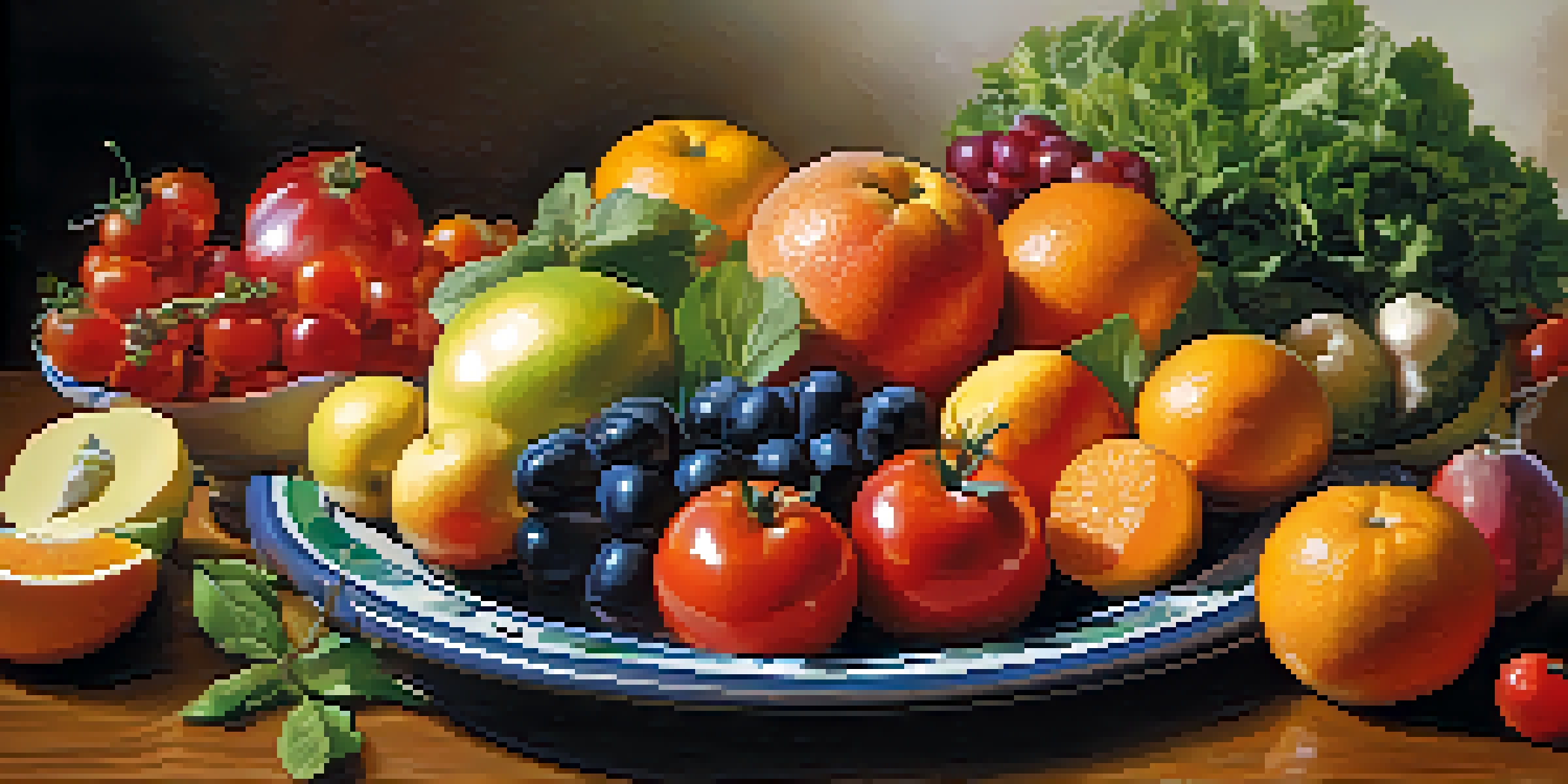The Importance of Variety in a Holistic Nutrition Plan

Understanding Holistic Nutrition and Its Elements
Holistic nutrition is about more than just calories; it encompasses the whole person. This approach focuses on nourishing the body, mind, and spirit through a balanced diet that considers individual needs. By addressing not just what we eat, but how we feel about food, we can create a more fulfilling eating experience.
Let food be thy medicine and medicine be thy food.
A holistic nutrition plan encourages the inclusion of various food groups, emphasizing whole, minimally processed foods. This means incorporating fruits, vegetables, whole grains, healthy fats, and proteins into your meals. Each food group offers unique benefits that contribute to overall health and well-being.
Moreover, holistic nutrition acknowledges the importance of lifestyle factors such as stress, sleep, and physical activity. By understanding how these elements interact with our dietary choices, we can better tailor our nutrition plan to support our personal health goals.
The Role of Variety in Nutritional Health
Variety in your diet is crucial for ensuring you get a wide range of nutrients. Different foods provide different vitamins, minerals, and antioxidants, all of which play essential roles in bodily functions. By mixing up your meals, you can help prevent nutritional deficiencies that could arise from a monotonous diet.

For example, while oranges are high in vitamin C, they lack other nutrients found in leafy greens like iron and calcium. Embracing a colorful plate not only makes your meals more appealing but also ensures you're covering all bases nutritionally. This variety can lead to improved energy levels and overall vitality.
Holistic Nutrition Embraces Variety
Holistic nutrition focuses on nourishing the whole person, integrating various food groups and lifestyle factors for overall well-being.
Additionally, consuming a diverse array of foods can positively impact your gut health. A varied diet supports a healthy microbiome, which is essential for digestion, immunity, and even mental health. The more diverse your diet, the happier your gut can be!
Culinary Exploration: Making Variety Fun
Incorporating variety into your meals doesn’t have to be a chore; it can be an exciting culinary adventure! Trying new recipes or exploring different cuisines can introduce you to flavors and ingredients you might never have considered. This exploration can reignite your passion for cooking and eating.
You are what you eat, so don't be fast, cheap, easy, or fake.
For instance, if you typically prepare Italian dishes, why not experiment with Thai or Mexican recipes? Each cuisine has unique spices and preparation methods that can enhance the nutritional profile of your meals. Plus, trying new foods can be a fun way to gather with friends and family.
Creating themed dinners or weekly challenges to try new ingredients can also add a sense of playfulness to your nutrition plan. Not only will you learn more about what you enjoy, but you'll also discover new favorites along the way!
Seasonal Eating: A Natural Way to Add Variety
One of the easiest ways to incorporate variety into your diet is by eating seasonally. Seasonal eating means choosing fruits and vegetables that are in season, which tend to be fresher and more flavorful. This practice not only supports local farmers but also encourages you to experiment with different ingredients throughout the year.
For example, during the summer months, you might enjoy juicy tomatoes and sweet berries, while fall brings hearty squash and crisp apples. Each season offers a unique bounty, allowing you to explore a wide range of tastes and textures. Seasonal eating can also inspire you to cook with new ingredients you may not have tried otherwise.
Seasonal Eating Boosts Freshness
Eating seasonally allows you to enjoy fresher, more flavorful ingredients while supporting local farmers and sustainability.
Moreover, seasonal produce is often more affordable and environmentally friendly. By focusing on what’s in season, you're contributing to sustainability while enjoying the benefits of fresh, nutrient-rich food.
Mindful Eating: Enhancing the Variety Experience
Mindful eating is about being present and fully engaged with your food. By slowing down and savoring each bite, you can appreciate the variety of flavors and textures in your meals. This practice can help you develop a deeper connection to food and enhance your overall eating experience.
When you focus on the sensory aspects of eating, such as color, aroma, and taste, you may find that you enjoy your meals more. This enjoyment can lead to healthier eating habits, as you’re more likely to choose foods that make you feel good. It also encourages you to try new dishes without the pressure of a strict meal plan.
Incorporating mindfulness into your meals can also help prevent overeating. By tuning in to your body’s hunger signals and appreciating the variety on your plate, you’ll be more likely to stop eating when you’re satisfied, promoting a healthier relationship with food.
Overcoming Barriers to Dietary Variety
While the benefits of dietary variety are clear, many people face barriers that can make it challenging to diversify their meals. Common obstacles include time constraints, lack of knowledge about new ingredients, or simply being stuck in a food rut. Recognizing these barriers is the first step in overcoming them.
To combat time constraints, consider meal prepping or planning your meals ahead of time. This approach can help you ensure you have a variety of ingredients on hand, making it easier to whip up diverse meals during the week. Additionally, exploring quick and easy recipes can make trying new foods less daunting.
Mindful Eating Enhances Enjoyment
Practicing mindful eating helps deepen your connection to food, encouraging enjoyment and healthier eating habits.
If you’re unsure about how to use a certain ingredient, don’t hesitate to seek resources! Cookbooks, food blogs, and cooking classes can provide inspiration and guidance. Remember, adding variety to your diet is a journey, not a race—take it one step at a time.
The Long-Term Benefits of a Varied Nutrition Plan
Incorporating variety into your nutrition plan is not just about immediate satisfaction; it has long-term benefits as well. A diverse diet can lead to better health outcomes, including improved heart health, stronger immunity, and a lower risk of chronic diseases. Over time, these advantages can translate into a higher quality of life.
Moreover, embracing variety fosters a positive relationship with food. When you view meals as an opportunity to explore and enjoy rather than a rigid set of rules, you’re more likely to maintain healthy eating habits over the long haul. This flexibility can lead to sustainable lifestyle changes that benefit your overall well-being.

Ultimately, a varied nutrition plan enriches your life in multiple ways, making each meal an experience to look forward to. So why not take the plunge and start experimenting with different foods today?